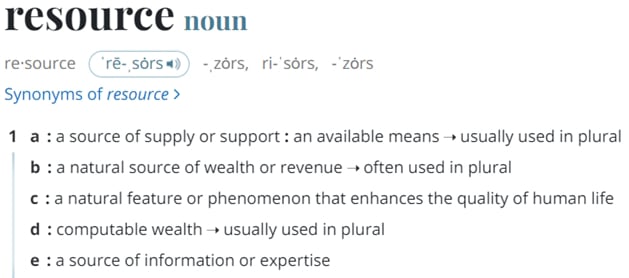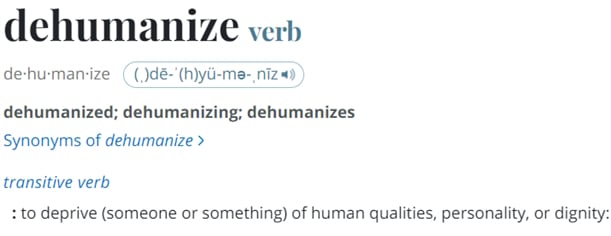Share this
People, not resources
by Nick Gubb on 20 July 2023
Welcome to part one of a three-part series on culture, looking into what impacts it, why it is valuable, and how we can change or scale it. In the first instalment, Nick Gubb ruminates on how simple language can impact how we talk about people and the wider implications it can lead to within an organisational culture.
Perhaps it's a personal pet peeve, a sign of a broader shift in cultural understanding or just a case of how language constantly evolves. Still, I have an issue when people refer to others as "resources".

Using "resources" isn't specific to IT but is rife throughout the industry, where we often hear talk about "resource planning", "resource capacity", or even the "HR Department".
It's so commonplace that I used to find myself doing it all the time. I had never stopped to think about how I was using particular words until a leader I worked with pointed it out. I was in a meeting then where four of the five people attending mentioned finding and allocating new resources to work on a project that was struggling to meet a deadline.
Recently I became aware of a conversation about a piece of work I was involved with. I found out later that other people were using the same language. And this time, I was the focus of it rather than the perpetrator.
Reflecting on it later was an enlightening experience! I felt like being treated as a thing rather than a person. It implied that someone else could replace me, and just because our CVs list the same skills, there would be zero impact on the work underway.
The people in this conversation ignored how I used my skillset, drew on my experience, or offered my perspective. It felt like I could be easily disposed of and replaced with another fungible resource at the drop of a hat.
As is tradition for any beginner writing their first blog or fine-tuning a wedding speech, I investigated the dictionary definition. Merriam-Webster defines "resource" as:

Source: Merriam-Webster Dictionary
So, a person could fit into the resource description as a means of support or, as in the last definition, "a source of information".
Thinking it over again, I'm sure the person didn't intend it in a meanspirited way. It felt extreme to label the feelings I mentioned above as "dehumanising", but the definition fits when referring to my good ol' mate Merriam-Webster (localised spelling aside):

Source: Merriam-Webster Dictionary
Every person we work with is another human being. They are individuals with their thoughts, opinions, and problem-solving abilities specific to them. Their experiences and preferences shape their abilities and how they tackle a particular challenge. This uniqueness is not considered if we boil people down to being "resources' and deprive or ignore their valuable traits and experiences.
People are the culture of an organisation. Leadership can shape and direct that culture (more on that in the coming weeks), and the company then realises the benefits of a happy, engaged, and motivated workforce.
Building and improving culture can start with minor improvements in language use, such as referring to people as people and not as swappable, fungible resources.
Culture needs to be based on treating employees with empathy and understanding, acknowledging their unique strengths, and supporting their personal and professional growth. It differs from scaling up and throwing additional processing power and memory resources at a virtual machine.
Next time you speak with your peers about the next project milestone, stop and think about whether you are talking about a resource or a person.
Other posts in this series:
Part 2: IT culture
Part 3: Culture change
Share this
- Agile Development (84)
- Software Development (66)
- Scrum (39)
- Business Analysis (28)
- Agile (27)
- Application Lifecycle Management (26)
- Capability Development (20)
- Requirements (20)
- Solution Architecture (19)
- Lean Software Development (17)
- Digital Disruption (16)
- IT Project (15)
- Project Management (15)
- Coaching (14)
- DevOps (14)
- Equinox IT News (12)
- IT Professional (11)
- Knowledge Sharing (10)
- Strategic Planning (10)
- Agile Transformation (9)
- Digital Transformation (9)
- IT Governance (9)
- International Leaders (9)
- People (9)
- IT Consulting (8)
- AI (7)
- Cloud (7)
- MIT Sloan CISR (7)
- ✨ (7)
- Change Management (6)
- Azure DevOps (5)
- Innovation (5)
- Working from Home (5)
- Business Architecture (4)
- Continuous Integration (4)
- Enterprise Analysis (4)
- FinOps (4)
- Client Briefing Events (3)
- Cloud Value Optimisation (3)
- GitHub (3)
- IT Services (3)
- .Net Core (2)
- Business Rules (2)
- Data Visualisation (2)
- Java Development (2)
- Security (2)
- System Performance (2)
- API (1)
- Automation (1)
- Communities of Practice (1)
- Kanban (1)
- Lean Startup (1)
- Microsoft Azure (1)
- Satir Change Model (1)
- Testing (1)
- January 2026 (2)
- November 2025 (1)
- August 2025 (3)
- July 2025 (3)
- March 2025 (1)
- December 2024 (1)
- August 2024 (1)
- February 2024 (3)
- January 2024 (1)
- September 2023 (2)
- July 2023 (3)
- August 2022 (4)
- July 2021 (1)
- March 2021 (1)
- February 2021 (1)
- November 2020 (2)
- July 2020 (1)
- June 2020 (2)
- May 2020 (2)
- March 2020 (3)
- August 2019 (1)
- July 2019 (2)
- June 2019 (1)
- April 2019 (2)
- October 2018 (1)
- August 2018 (1)
- July 2018 (1)
- April 2018 (2)
- January 2018 (1)
- September 2017 (1)
- July 2017 (1)
- February 2017 (1)
- January 2017 (1)
- October 2016 (2)
- September 2016 (1)
- August 2016 (4)
- July 2016 (3)
- June 2016 (3)
- May 2016 (4)
- April 2016 (5)
- March 2016 (1)
- February 2016 (1)
- January 2016 (1)
- December 2015 (5)
- November 2015 (11)
- October 2015 (3)
- September 2015 (1)
- August 2015 (1)
- July 2015 (7)
- June 2015 (7)
- April 2015 (1)
- March 2015 (2)
- February 2015 (2)
- December 2014 (3)
- September 2014 (2)
- July 2014 (1)
- June 2014 (2)
- May 2014 (8)
- April 2014 (1)
- March 2014 (2)
- February 2014 (2)
- November 2013 (1)
- October 2013 (2)
- September 2013 (2)
- August 2013 (2)
- May 2013 (1)
- April 2013 (3)
- March 2013 (2)
- February 2013 (1)
- January 2013 (1)
- November 2012 (1)
- October 2012 (1)
- September 2012 (1)
- July 2012 (2)
- June 2012 (1)
- May 2012 (1)
- November 2011 (2)
- August 2011 (2)
- July 2011 (3)
- June 2011 (4)
- April 2011 (2)
- February 2011 (1)
- January 2011 (2)
- December 2010 (1)
- November 2010 (1)
- October 2010 (1)
- February 2010 (1)
- July 2009 (1)
- October 2008 (1)